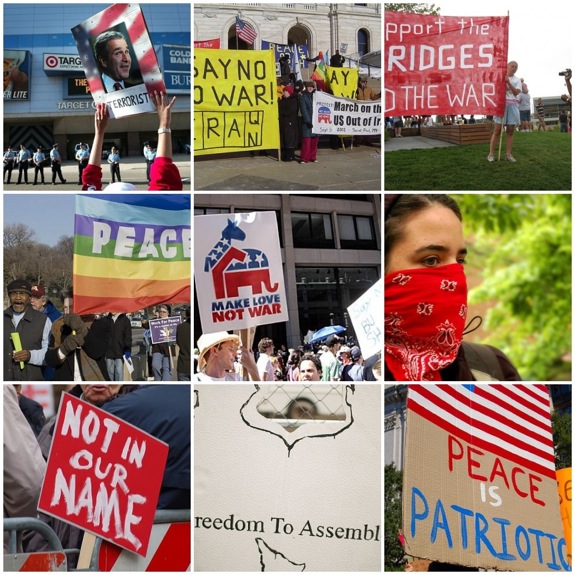Photo: The Minnesota Independent
by Marianne Cerilli
As a lead up to the Republican National Convention in Minneapolis/St. Paul, I was asked by Stephan Peter, politics professor and Democratic Socialists of America member, to speak to students and activists. The title of my talk with Americans was “Among Friends; A Canadian Perspective on U.S. Politics.”
Local activists were preparing to rally in peaceful protest to the Republican agenda, no matter who the President and VP choices were. I was asked to talk about what the G. W. Bush legacy has meant to Canada and to present a Canadian wish list for the new American President.
I was specifically asked to overview what is happening in Canadian politics. I didn’t anticipate our PM would break his own law and bury a Canadian election under the U.S. election, taking deep integration to a whole new level. And after a summary of the Bush legacy, I focused on the militarization of our two countries under Bush and Harper (and to some extent before that Martin and Chretien.)
Iraq and Afghanistan are the same war
Probably the most provocative issue I discussed was support for the war in Afghanistan. Given the Obama position in favour of getting out of Iraq and moving military operations to Afghanistan, my American friends were challenged by my suggestion that Iraq and Afghanistan are the same war. When asked about this I discussed the construction of an oil pipeline through Afghanistan to Iraq and the privatization of public oil companies by the new U.S. controlled governments. The rational for this new American position of moving to Afghanistan is that Afghanistan is where the terrorists are, meaning Bin Ladin and the perpetrators of 9/11 attacks of 2001.
The question from one of the academics was educational for me because it illuminated what the focus must be for the peace movement and hopefully some political parties in this surprise Canadian election.
If we are interested in building support for demilitarization and more peaceful approaches to world affairs, and if terrorism is being promoted and believed to justify wars and other “security” measures, then we have to articulate the following:
- How terrorism is not really the motivation for theses wars; they are about oil and control of the drug trade, and laundered drug money (which is also used finance weapons trade).
- How fighting terrorism with massive military action has been counter productive and how terrorism has actually increased since these military actions; and what motivates the terrorists is not just religious righteousness but also opposition to what they see as economic terrorism through U.S. foreign policy.
- Alternatives to perpetual wars on terrorism (or what is really necessary to counter terrorism.)
The following list of “Ending Terrorism What Will it Really Take?” by American Andy Mager, of Syracuse Cultural Workers, is a good start.
Ending Terrorism: What will it Really Take?
- Refuse to support military solutions to social and political problems.
- Honestly define terrorism as attacks that target civilians… regardless of the perpetrators. (This would make a lot of American Foreign Policy terrorism,)
- Oppose corporate globalization, which is viewed by people around the world as economic terrorism.
- Stop weapons exports.
- Support international institutions, such as the World Court, to prosecute crimes against humanity.
- Base U.S. foreign policy on fairness and equality.
- Recognize and address historic and current racism.
- Don’t support terrorists, dictators and repressive regimes (even to expand market share).
- Strengthen the United Nations and other international institutions to address poverty and inequality.
- Work to eliminate all weapons of mass destruction.
- Understand that a “might is right” U.S. foreign policy breeds resentment.
The other focus of my talk in Minnesota was the free trade agreements. I noted that even more Canadians oppose the trade agreements than the war in Afghanistan. I recommended that a new president should not only renegotiate NAFTA but also should use his power to think bigger and add similar social, environment and cultural policies and principles to UN organizations like the WTO, IMF and UN System of National Accounts.
I suggested that ending structural adjustment requirements and allowing local economies to develop, setting a framework for fair trade while planning on how to conserve and share dwindling natural resources, particularly oil, is key to peace in our time as well as meeting the challenge of climate change.
Hopefully this election season in Canada and the U.S., there are political parties that will propose this approach to public policy.



